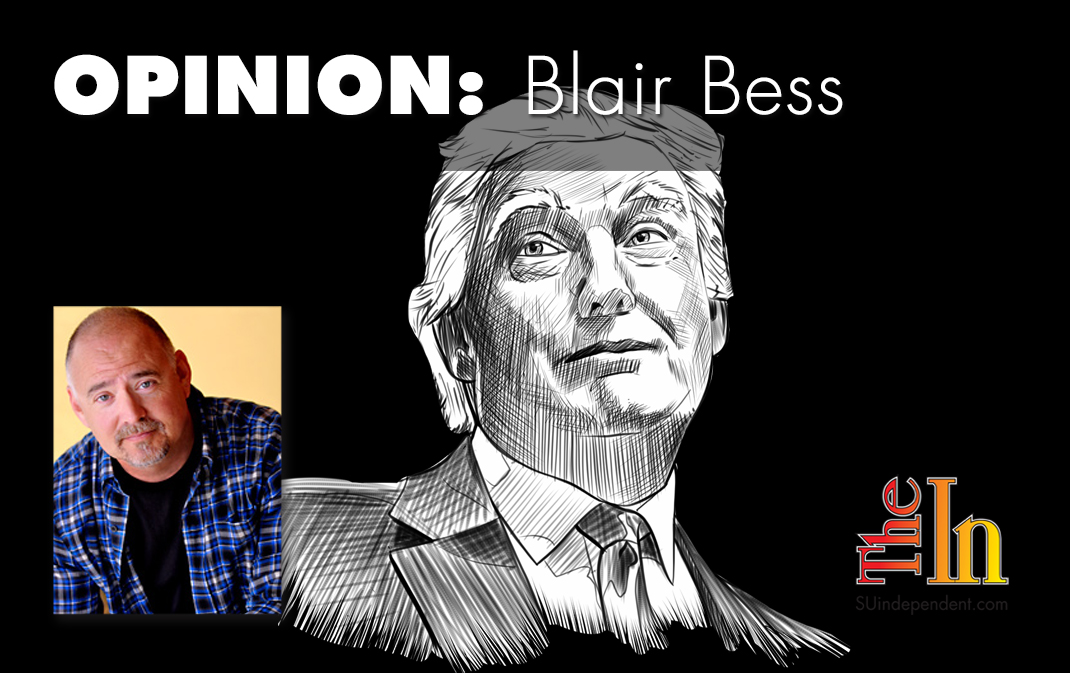
Trump betrayed
By Blair Bess
Hell hath no fury — or fire — like a president scorned.
After weeks of equivocating, President Trump has finally blasted the Saudi government for the murder of Washington Post columnist Jamal Khashoggi and its subsequent cover-up. The president did so not out of a sense of moral outrage but of a feeling more personal in nature — a sense that he has been betrayed by those whose loyalty he believed he commanded.
By their actions, members of the Saudi royal family have now joined the ranks of Steve Bannon, Michael Cohen, Omarosa, and a litany of others in Trump’s universe.
One almost feels sorry for the president. He’s notoriously thin skinned and easily injured by those who do him wrong. In the wake of Khashoggi’s assassination, he’s now set his sights on Crown Prince Mohammed bin Salman — MBS to his friends — angered both by the prince’s perceived betrayal and the humiliating shadow MBS cast upon the Trump presidency.
Before meeting with allies whose interests are more aligned with our own, the president chose instead to go sword dancing in the desert. One explanation might be that the House of Saud has more in common with the House of Trump than do member nations of NATO or fellow signatories of NAFTA, even though theirs is a nation where the lines drawn between state assets and personal wealth are often blurred. I, of course, mean the Saudis. Not the Trumps.
In a region where the United States is still viewed by many as the Great Satan, the president chose to dance with a different kind of devil. One whose kingdom is rife with corruption and oppressive of its citizens. A land where loyalties are as fluid as the oil beneath its surface.
By placing his hands upon a glowing orb in Riyadh last year alongside those of Egyptian President Abdel Fattah el-Sisi and Saudi King Salman, the president believed he had effectively sealed a deal of historic proportions. But then, in his eyes any deal he makes is one of great historical import. They’re always bigger, better, and bolder than any made by his predecessors.
Temptation was hard to resist. A questionable $110 billion arms deal. Access to cheap oil. A partner in combating Iranian aggression. A willing participant in resolving conflict between the Israelis and Palestinians. All loomed on the horizon, though they now appear to be nothing more than a mirage.
Trump isn’t the only world leader to tolerate the indiscriminate atrocities and human rights violations sanctioned by the House of Saud over the years. Americans have long engaged with the royal family since the modern kingdom’s founding and the discovery of immense oil reserves there 80 years ago. Governments that do business with the Saudis have always been aware of the monarchy’s ruthlessness, yet its role as a strategic partner has long required them to turn a blind eye to its internal affairs.
Current and former officials from across the political spectrum recognize that it’s in everyone’s best interests to maintain good relations with the Saudis. This is realpolitik, where diplomacy is governed by circumstances and practicalities, irrespective of moral and ethical suppositions. Trump, Secretary of State Mike Pompeo, and congressional leaders on both sides of the aisle know this. It’s the cold cost of doing business. And while disengagement may not be the answer, the blatant murder of Jamal Khashoggi — among many other ongoing Saudi atrocities in the region — can’t be condoned or accepted as politics as usual and can’t go unanswered. By not forcefully confronting the Saudis’ latest treachery, we only accelerate the deterioration of our own values.
President Trump’s late acknowledgement of the role MBS and the Saudi royal family played in Jamal Khashoggi’s slaying is of little comfort. It is unfortunate that it took him so long. Even more so that it is borne of his own hurt feelings rather than a sense of righteous anger.
The viewpoints expressed above are those of the author and do not necessarily reflect those of The Independent.
How to submit an article, guest opinion piece, or letter to the editor to The Independent
Do you have something to say? Want your voice to be heard by thousands of readers? Send The Independent your letter to the editor or guest opinion piece. All submissions will be considered for publication by our editorial staff. If your letter or editorial is accepted, it will run on suindependent.com, and we’ll promote it through all of our social media channels. We may even decide to include it in our monthly print edition. Just follow our simple submission guidelines and make your voice heard:
—Submissions should be between 300 and 1,500 words.
—Submissions must be sent to editor@infowest.com as a .doc, .docx, .txt, or .rtf file.
—The subject line of the email containing your submission should read “Letter to the editor.”
—Attach your name to both the email and the document file (we don’t run anonymous letters).
—If you have a photo or image you’d like us to use and it’s in .jpg format, at least 1200 X 754 pixels large, and your intellectual property (you own the copyright), feel free to attach it as well, though we reserve the right to choose a different image.
—If you are on Twitter and would like a shout-out when your piece or letter is published, include that in your correspondence and we’ll give you a mention at the time of publication.
Articles related to “Trump betrayed”
After Saudi visit, “freedom” just another word for home sweet home



